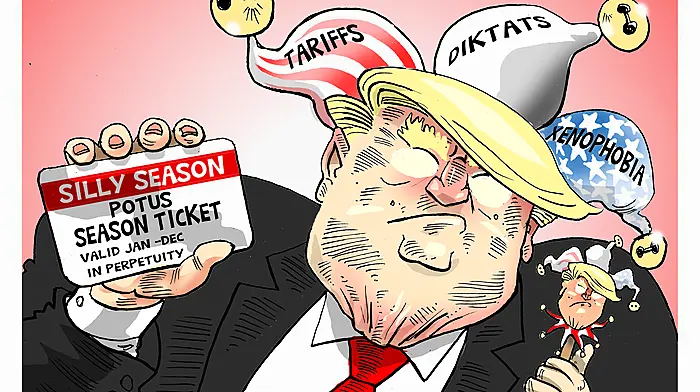THIS Sunday sees the anniversary of Ireland’s initial decision to join the European Communities.
While we officially joined on January 1st 1973, (50 years ago this year), that move was the result of many years of preparations and negotiations, beginning with the signing of the Treaty of Accession to join the European Communities – which took place on January 22nd 1972.
Earlier this month, An Post unveiled its first stamp of 2023 which noted the anniversary.
The stamp, designed by Ger Garland, features the flag of what is now known as the European Union (EU). The design is based on the stars of the EU flag and the six fundamental values of the EU: human dignity, freedom, democracy, equality, the rule of law, and human rights. To symbolise the number of members of the EC in 1973, only nine of the twelve stars from the EU flag are visible.
The EU has impacted on all our lives in very tangible ways – from economic growth, to environmental protection, to gender equality and equal pay legislation, to climate, energy, travel and peace, it was stated on the day of the stamp’s unveiling.
Having signed up for Europe, membership meant that the Oireachtas would no longer be the sole law-making power in Ireland.
This required a change in the Constitution and so a referendum took place on May 10th 1972 during which more than 83% voted in agreement with the government’s proposal to join the European Communities – then known to us all as ‘the EC’.
The government has reminded us this year that joining the EC brought us major benefits – including access to a market of over 510m people, thousands of jobs, and increased trade. It also gave Irish citizens the right to work in the other member states. Over time membership helped to bring peace and political agreement in Northern Ireland through support and investment in cross-border programmes.
Foreign direct investment into Ireland increased dramatically with EC membership. Between 1973 and 2015, Ireland received over €74.3bn in European funding, while Irish farmers received €54bn from the Common Agricultural Policy (Cap).
With the formation of the European Union in 1993, the European Economic Community (EEC) was incorporated into the EU and renamed the European Community (EC). In 2009, the EC formally ceased to exist and its institutions were directly absorbed by the EU.
While there has been some highlighting of particular issues that could have been better negotiated, the overall consensus is that being part of Europe has been a major benefit to Ireland.
While in recent years we have watched our nearest neighbours grappling with the aftermath of its decision to leave, we have – in the most part – looked on with rather smug recognition that our inclusion in Europe made us a net beneficiary – and not just financially. In fact, we are now a net contributor to Europe, thanks to our improving economic status.
The EU budget has most certainly had a transformative effect on our economy, bringing it from an agriculture-dependent one, to a country that is now known for its hi-tech industry, pharmaceutical production and research, and global food exports.
But what has probably been invaluable in recent months is its sense of unity and strength in the face of Russia’s aggression to one of Europe’s nearest neighbours – Ukraine. There is no doubt that being an island on the edge of Europe presents its own challenges in a world where large scale aggressors can hugely intimidate independent nations.
Knowing that we are part of a greater grouping in Europe, all with a common goal, to see an end to the war on Ukraine, can give us some solace in a time of major instability on our doorstep.








